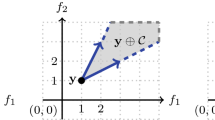Abstract
In this paper we present an accelerated stopping rule for improving the performance of the Nested Partition Hybrid Algorithm (NPHA), which is a general purpose algorithm for stochastic discrete optimization. Numerical examples will illustrate the impact of the accelerated stopping rule on the overall performance of NPHA.

Similar content being viewed by others
References
Alrefaei M H, Andradòttir S (1999) A simulated annealing algorithm with constant temperature for discrete stochastic optimization. Manag Sci 45:748–764
Alrefaei M H, Andradòttir S (2001) A modification of the stochastic ruler method for discrete stochastic optimization. Eur J Oper Res 133:160–182
Andradòttir S (1995) A Method for Discrete Stochastic Optimization. Manag Sci 41:1946–1961
Andradòttir S (1996a) A global search method for discrete stochastic optimization. SIAM J Optim 6:513–530
Andradòttir S (1996b) Handbook of Simulation: principles, methodology, advances, applications, and practice. Wiley, New York
Branke J, Chick SE, Schmidt C (2007) Selecting a selection procedure. Manag Sci 53:1916–1932
Chen C H (1996) A lower bound for the correct subset selection probability and its application to discrete-event system simulations. IEEE Trans Autom Control 41(8):1227–1231
Chen CH, Lin J, Yücesan E, Chick SE (2000) Simulation budget allocation for further enhancing the efficiency of ordinal optimization. Discrete Event Dyn Syst 10(3):251–270
Chen CH, He D, Fu M, Lee LH (2008) Efficient simulation budget allocation for selecting an optimal subset. INFORMS J Comput 20(4):579–595
Chen CH (2010) Stochastic simulation optimization: an optimal computing budget allocation. vol. 1, World scientific
Fu MC (2002) Optimization for simulation: theory vs. practice. INFORMS J Comput 14(3):192–215
Fu MC, Glover FW, April J (2005) Simulation optimization: a review, new developments, and applications. In: Proceedings of the 2005 winter simulation conference, pp 83–95
Gong WB, Ho YC, Zhai W (1999) Stochastic comparison algorithm for discrete optimization with estimation. SIAM J Optim 10:384–404
He D, Lee L H, Chen CH, Fu M, Wasserkrug S (2010) Simulation optimization using the cross-entropy method with optimal computing budget allocation.ACM Trans Model Comput Simul 20(1):4:1-4:22
Ho YC, Zhao QC, Jia QS (2007) Ordinal optimization: soft optimization for hard problems. Springer, New York
Hong LJ, Nelson BL (2006) Discrete optimization via simulation using COMPASS. Oper Res 54(1):115–129
Hong LJ, Nelson BL (2009) A brief introduction to optimization via simulation. In: Proceedings of the 2009 Winter Simulation Conference, pp 75–85
Hu J, Fu MC, Marcus SI (2007) A model reference adaptive search method for global optimization. Oper Res 55:549–568
Pichitlamken J, Nelson BL (2002) A combined procedure for optimization via simulation. In: Proceedings of the 2002 Winter Simulation Conference, pp 292–300
Pichitlamken J, Nelson BL (2003) A combined procedure for optimization via simulation. The ACM Trans Model Comput Simul 13:155–179
Schmidt C, Branke J, Chick SE (2006) Integrating techniques from statistical ranking into evolutionary algorithms. Lect Notes Comput Sci 3907:752–763
Shi L, Òlafsson S (2000) Nested partitions method for global optimization. Oper Res 48(3):390–407
Shi L, Chen CH (2000) A new algorithm for stochastic discrete resource allocation optimization. Discrete Event Dyn Syst Theory Appl 10:271–294
Shi L, Òlafsson S (2002) Ordinal comparison via the nested partitions method. Discrete Event Dyn Syst Theory Appl 12:211–239
Vakili P (1991) Using a standard clock technique for efficient simulation. Oper Res Lett 10:445–452
Vakili P, Ho YC, Sreenivas RS (1992) Ordinal Optimization of DEDS. Discrete Event Dyn Syst Theory Appl 2:61–88
Xu J, Nelson BL, Hong LJ (2010) Industrial strength COMPASS: a comprehensive algorithm and software for optimization via simulation. ACM Trans Model Comput Simul 20(1). Article No 3
Yan D, Mukai H (1992) Stochastic discrete optimization. SIAM J Optim 30:594–612
Zhang S, Chen P, Lee LH, Peng CE, Chen CH (2011) Simulation optimization using the particle swarm optimization with optimal computing budget allocation. In: Proceedings of the 2011 winter simulation conference, pp 4303–4314
Author information
Authors and Affiliations
Corresponding author
Rights and permissions
About this article
Cite this article
Berkhout, J. An accelerated stopping rule for the Nested Partition Hybrid Algorithm for discrete stochastic optimization. Discrete Event Dyn Syst 25, 441–452 (2015). https://doi.org/10.1007/s10626-014-0191-9
Received:
Accepted:
Published:
Issue Date:
DOI: https://doi.org/10.1007/s10626-014-0191-9




